Becoming a University Fresher
In the Beginning…
Before going to university, I was a just as nervous as I was excited. I was nervous because I knew university would be a big change for me living on my own for the first time, far away from home. I was also excited because I knew that university would mould me into a new person and I was intrigued to see who I might become. The last few days at home in Cambridge, were probably the most difficult days for me because sitting in that in-between stage of nerves and excitement, on the cusp of entering a completely different life, made me feel apprehensive and emotions were definitely running high. On the outside, I probably appeared to be settled but on the inside, the build up to university certainly made me feel more uneased as move-in day gradually drew near.
The night before I left Cambridge was definitely an emotional one. My mum, my dad, my sister and her boyfriend all gathered together for the evening to say one final goodbye. My mum made a nice dinner and we all watched a film together. As I had anticipated from observing the look on my mum’s face, she cried soon after eating dinner and my sister soon followed. I sat with my mum to try and reassure her and part of me felt a bit guilty for leaving. Yet, my mum said, as she should do, “I’m not crying because I don’t want you to go, I’m crying because I am happy for you and it will just be a big change.” Ultimately, she was right but it is times like this when you realise how much time flies. One moment, I am anxious about going to secondary school and the next I am anticipating going to university. Being there and seeing this, certainly made me realise how important it is to enjoy the moment. Meanwhile, if one zoomed out from the picture in that moment, all they would be able to see are three girls (my mum, my sister, and me) crying in a huddle whilst two men (my sister’s boyfriend and my dad) look at each other confused, unable to figure out what to do with themselves. My sister’s boyfriend even said “Jesus Christ, she’ll only be gone for 2 months. She’ll be back before you know it!” Although it felt like a long time back then, now that the first term is already finished, I realise that he was perhaps right about that.
One of the things that kept me up at night in the in-between stage just before leaving, was the thought of meeting my flatmates. Before I left, I heard so many stories from people who have been to university before, saying that they had arguments with their flatmates and that they had to deal with people being really messy, untidy, and generally disrespectful. Quite often, my mind wondered to the extremes, just thinking about the type of people I would be living with. Since I arrived at Durham, I’ve heard a couple of horror stories about other people’s flatmates but most of them were more light-hearted. Despite my initial anxieties, I ended up getting a nice group of people to be around. I guess I am outnumbered in the flat in the sense that I am one of two girls in a flat of six people but even if we don’t always see each other, we get along and we are all respectful in our shared space. This is something that I am very thankful for because certainly for the first few days of term when I was settling in, learning to be on my own, it really helped to be in an environment that was friendly and welcoming.
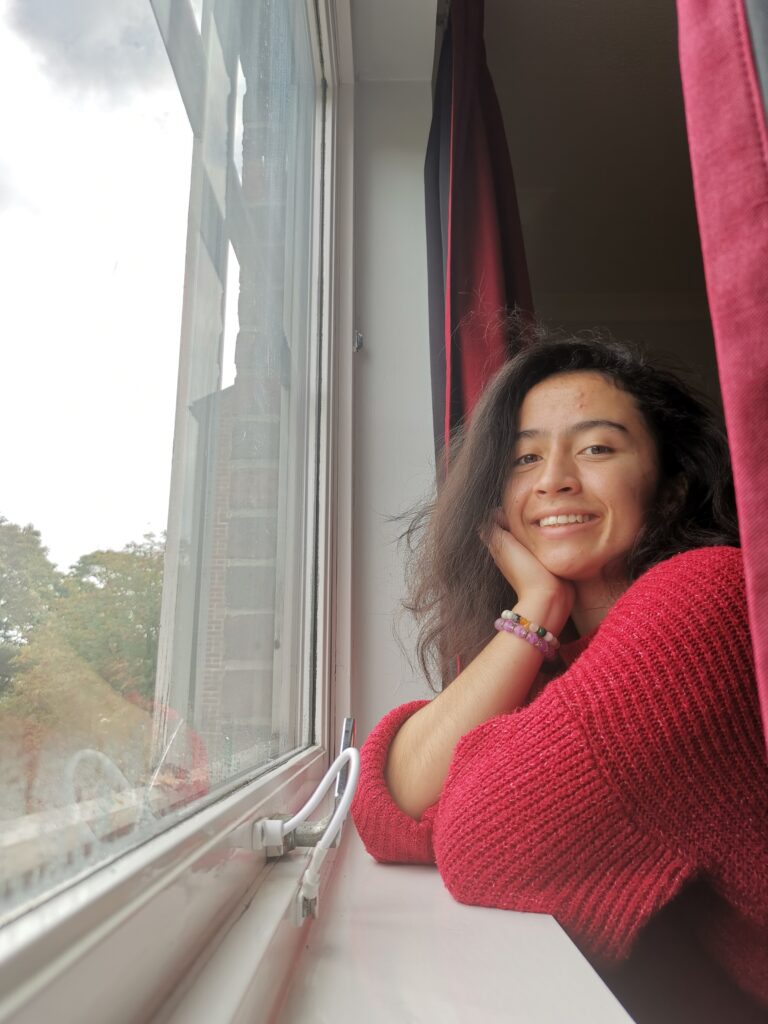
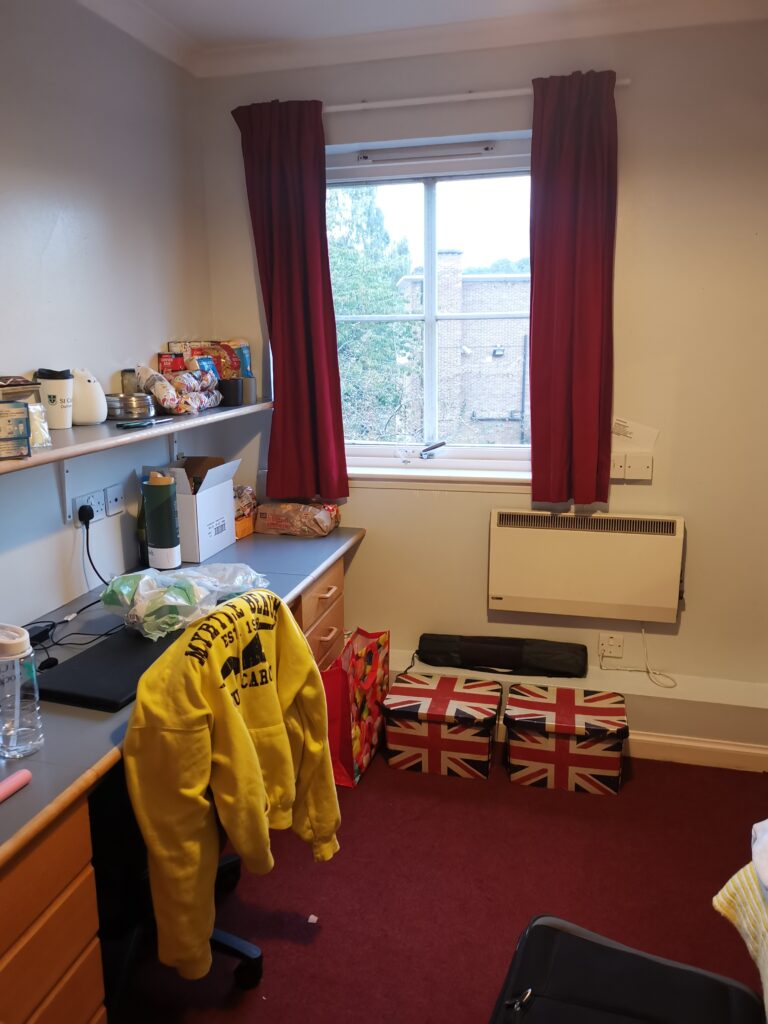
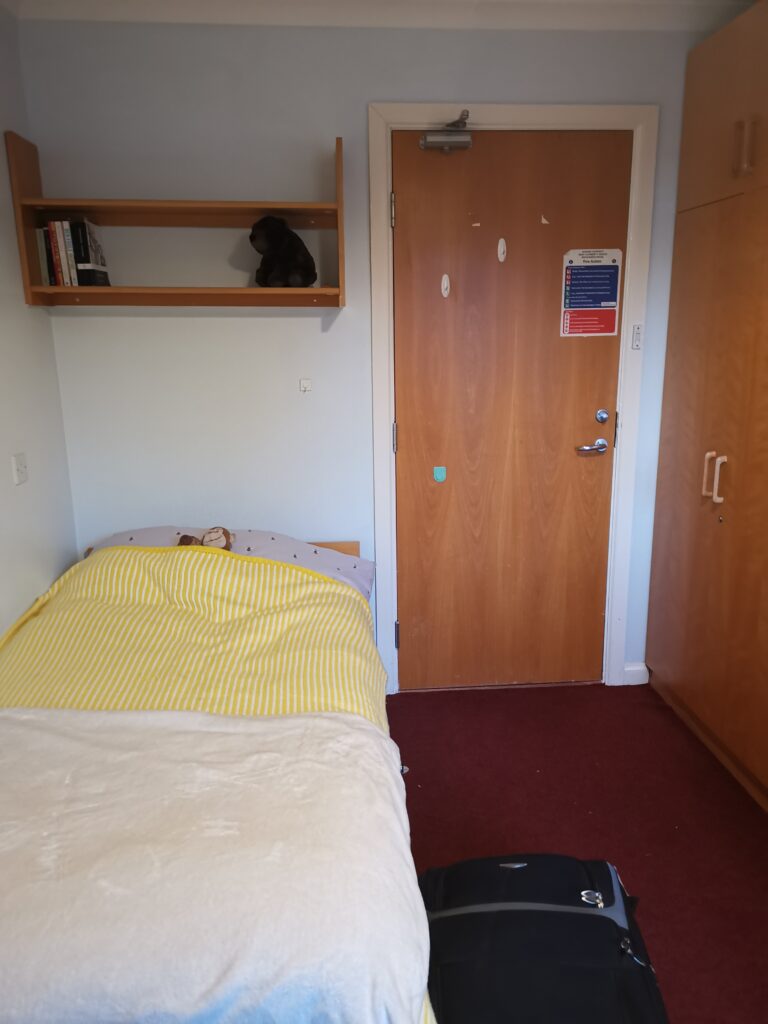
Freshers’ Week
Freshers’ Week was an entire experience in and of itself. On the first night, I went out for a drink with my flatmates at the student bar and it was then that I was introduced to the weird college drinks. St Cuthbert’s Society is my college at Durham and the colour associated with Cuth’s is green so the college drinks are called the Tadpole, the Toad and the Frog. When I arrived at the bar, I wasn’t entirely sure what I was looking at so to make my life a little bit easier when choosing what drink to have, I decided to go with whatever my flatmate was having so when she chose to have the Toad, I chose to have the Toad as well. After I paid for the drink, what I was given was a pint of alcohol that was a mix of WKD, lemonade, and something else (who knows what else is in that drink, honestly). But somehow, true to the college colour, the drink turned out to be green. I would probably say that the toad is now my preferred college drink but initially, it was quite confusing to be handed a pint of indiscernible green-coloured liquid and I think that drink set a certain precedent for the the rest of Freshers’ Week.
One aspect of Freshers’ Week was meeting my college parents. College parents are second-year students at the university who volunteer to be mentors to the first-year fresher students. There was a form to fill out when you arrived at college to say that you wanted to get college parents but I didn’t fill it in because I didn’t think it was important at first. To be honest, considering that I have not spoken to my college parents since the beginning of term, it was probably never that important. However, there was a whole evening prepared on Freshers’ Week to meet your college parents and out of peer pressure, I went to the evening to try and get myself adopted! Saying that feels a bit weird since had I not taken a gap year, I would probably be in the same year as my college parents but I tried to look past that as much as possible. It probably took between the region of 1 to 2 hours to find myself some parents and I will never understand why it took that long. But eventually, I was sitting down with my college parents and my two college sisters, having a drink at the bar.
One of my college sisters left early since she still lived at home in Darlington, only a short drive away from Durham. It was at this moment in time when our college parents brought up the prospect of a “house party.” They said to us that the plan for the evening was to bring us back to their place where they were hosting this house party. It was essentially a chance for us to meet their friends and other freshers who would be there. It sounds really nice and I’m sure it came from a good place but of course, if you look 2 months into the future, I have not heard anything from my college parents! Despite our initial hesitations, me and my college sister soon found ourselves sitting on the sofa of a student house amongst other freshers, including a couple of my flatmates. Within my vicinity was another indiscernible drink but this time it was red instead of green. A vodka cranberry most probably but to be honest, I wasn’t entirely sure. As I glanced over my shoulder, my college sister was sitting beside me in fits of laughter, unable to control herself. It was clear that the indiscernible red drink had taken effect. Although I only had one drink at the college bar, I think the energy rubbed off on me a bit as I started to laugh at everything and anything she was saying, for literally no reason too. Meanwhile, my flatmate sat on the other side of the sofa looking at us in a very confused manner. He was also the one who had to walk us both home, which must have been a sight to see. When I was talking about the house party to the flat the next day, I was talking about how I experienced a funny five minutes with my college sister. My flatmate who was sitting at the table next to me, then said “I’m sorry, a funny five minutes? More like 2 hours of non-stop giggling.” I wasn’t even meant to get college parents, but somehow I was adopted and had the weirdest night of my life. Yet, despite how weird the night was, I am very happy that I did go to the house party as I was able to meet someone new and have a really good time. Although we don’t see each other all the time, me and my college sister still act like two very crazy people whenever we do meet up.
The other parts of Freshers’ Week were interesting too. There were some normal activities taking place such as pub quizzes, formal dinners, karaoke and open-mic nights, and various games of pool and darts. Me and a group of girls, also went to Bohemia (a night club), where we danced until late. Durham doesn’t have the best clubbing experience but I suppose you’ve got to try it out on Freshers’ Week. There was also the Matriculation ceremony where we walked as a college to the cathedral to get officially registered into the university. I say Matriculation was a normal process but most of it wasn’t. Firstly, we took the longest walk ever to get to the cathedral and the girls were desperately trying not to die in their high heels. Secondly, we stopped for a moment outside the cathedral, as we cheered on our college Freps trying to jump through trees (don’t ask). Thirdly, we shouted chants like “If you drive on the Bailey you’re a c*nt!” to cars passing by. Apparently, this chant forms an integral part of the college banter but it was probably really confusing to hear to those driving by, just trying to get from A to B. But we’ll look past that and focus on how smart we all looked for the occasion. We’ll look past that because there were other funny incidences that happened during Freshers’ Week. For instance, one time, I went to a silent disco night with some of my flatmates at the Bailey. I wasn’t really sure if the silent disco would be something that I would enjoy. When the headphones are put on you and you’re the one dancing to music, it can be quite a fun activity to get involved in. But it probably looks really weird from the outside perspective, watching people dancing and singing in a silent room to music that only they can hear. However, thankfully the music was made up of fun and upbeat songs that were excellent to dance to so I ended up having a really good time. I was just dancing to nostalgic music from the 2000s with some friends I had made that week, when suddenly the doors burst open and one of my flatmates walked in, hands fully in the air, vibing to music he was probably completely unaware of. After seeing how many green-coloured college drinks were in his hand that evening, this situation probably made sense. However, it has to be said that after a certain point in the evening, I began to lose energy so I decided to ditch the party. But as I was leaving, out of the corner of my eye, I see my flatmate in the middle of the dance floor, still dancing to music pretty much on his own. All I could say to myself as I left was, fair enough, fair enough!
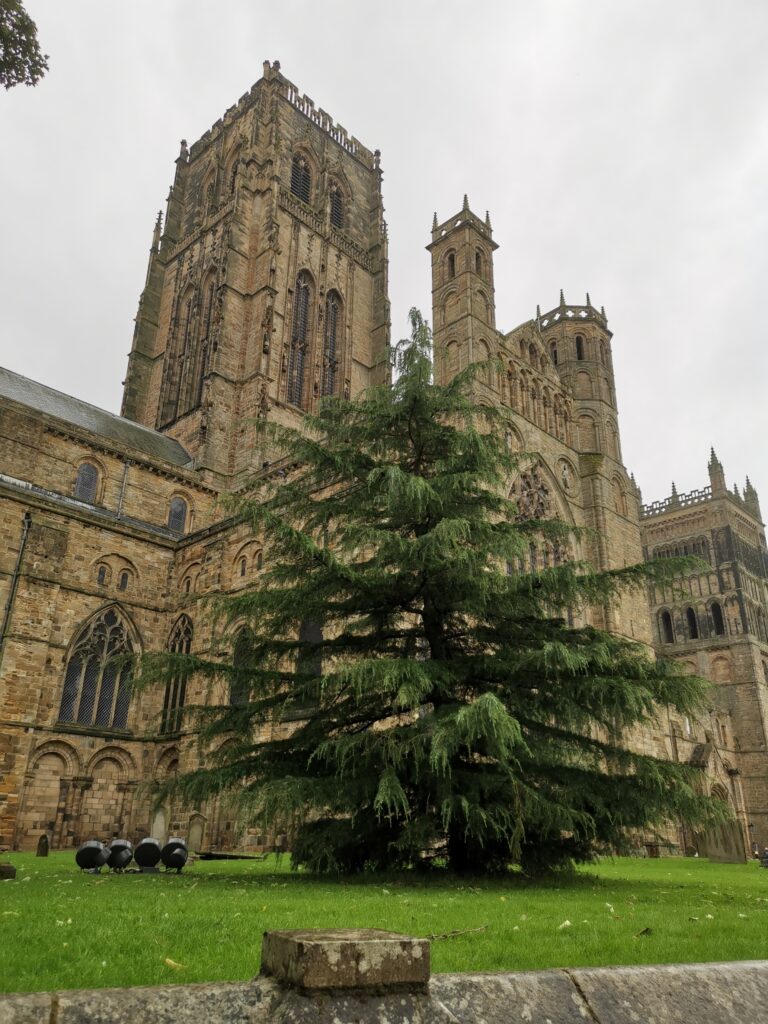
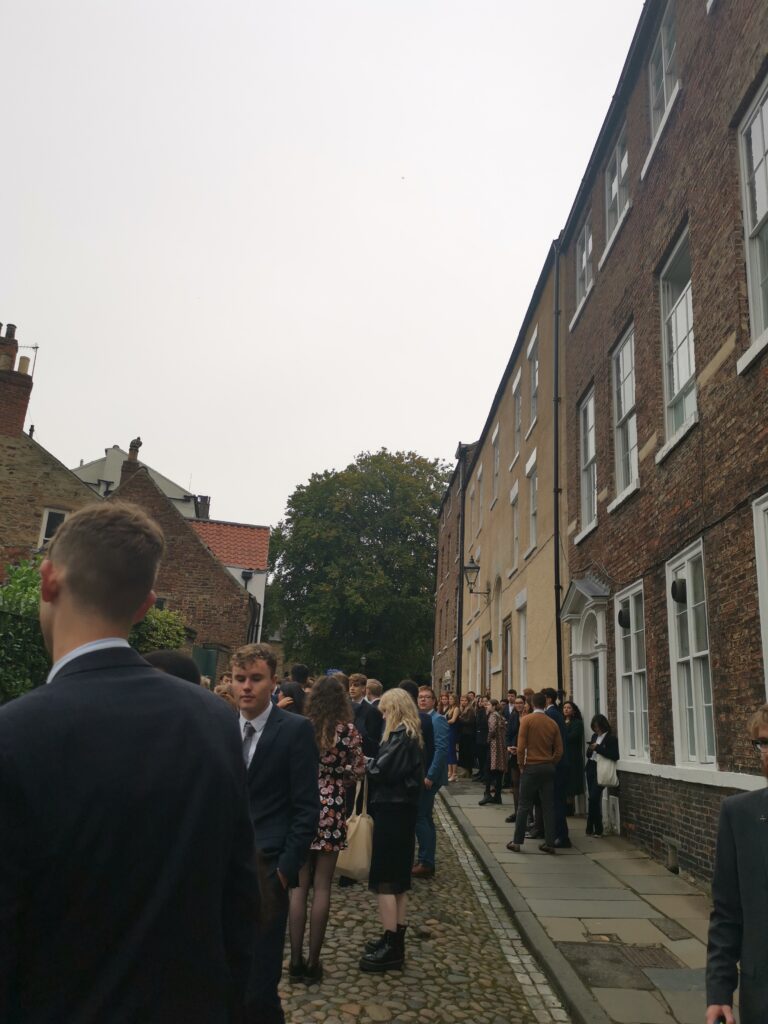
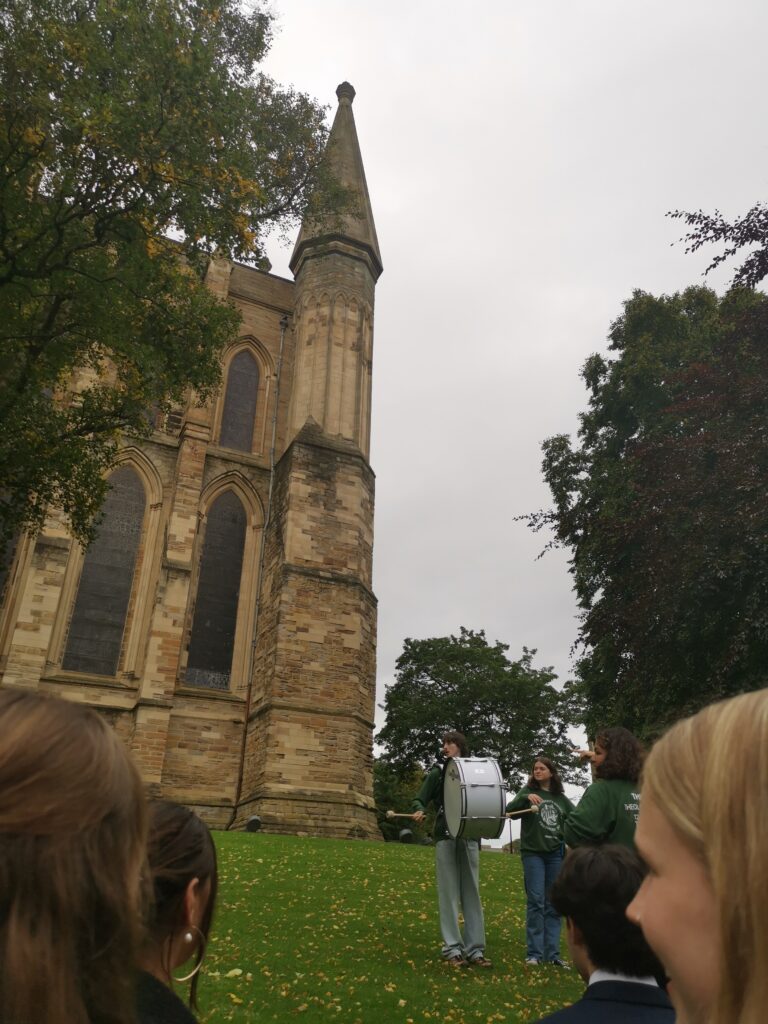
Lectures and Seminars
So that was Freshers’ Week. It was very much enjoyable but by the end of it, part of me was also happy to see lectures coming around the corner. For the first year studying history, you have 4 optional modules that you take alongside the core Making History module. The four optional modules I chose were Transformations in the Late Antique Mediterranean, Connected Histories, South Asia: Texts, Artefacts, and Empires, and the Atlantic Archipelago. The Late Antique module is about the Roman Empire from the 4th century as it begins to break down. It’s called ‘Transformations in the Late Antique Mediterranean’ because it focuses on the transition from the Roman period to the early middle ages. It is the module that I probably know the least about but it is definitely one of my favourites because my lecturers make it so interesting. Connected Histories and the Atlantic Archipelago both focus on the early modern period but for the Atlantic Archipelago, links are made between events such as the Reformation, to things like the British Empire and the Atlantic Slave Trade. I find these connections to be a bit far-fetched at times but the seminars for this module are very interesting as the discussions and readings are particularly thought-provoking. ‘Connected Histories’ is a term used to describe a specific school of thought in history that studies the big changes in the early modern period such as the Reformation and the Renaissance. Historians of this school of thought see what aspects of society remained the same during these big ‘ruptures.’ This is another one of my favourite modules because we get to look at people such as Martin Luther and Erasmus of Rotterdam, who were very pivotal characters of the Reformation and Renaissance. The South Asia module studies civilisations like the Mughal Empire and various religions in South Asia such as Hinduism, Buddhism, Jainism, and Islam. For the Making History module, I chose the strand about the religious heretics in the South of France. Here, I study heretics like the Beguines, Cathars, and Waldensians of the thirteenth century.
Getting used to the way lectures and seminars work, alongside the reading and writing that I have to do for the course, was an entire process in itself. What have I learnt from the experience? That I am such a crier. Jesus Christ, I am such a crier! When I chose my modules for the course, I chose subjects that I had never studied before on purpose because my logic at the time was that these lectures have to be worth my time if I have to spend £9,000 a year to be at university. I was not about to start covering periods that I had already covered at school when now was my time to really start learning something new. So when I saw a course about the Roman Empire and a course about empires in South Asia, I decided to study those modules because they were all new to me. What I didn’t do, was cut myself some slack when it came to reading the material for these modules. Not only was I getting used to the academic language of historians in books and articles, I was also getting to grips with the actual content of the modules. When I first started, I found reading quite hard because the language of the material was not very forgiving to someone like me, who was also trying to learn from the things that she was reading. As a result, in the first few days of lectures, I rang my mum and I said to her that I hated reading and that I didn’t understand anything in the lectures! However, with time and the more lectures I did, the easier reading the books and articles became and the clearer the information was. Especially with regards to studying the Romans in the Late Antique period. At first, I didn’t know anything about the different emperors that ruled and the different barbarian kingdoms that invaded but towards the end of the first term, I grew more confident about discussing emperors like Justinian in seminars. That’s what seminars are for, to consolidate the information you’ve acquired through the lectures and reading and develop the thinking skills of your subject. At first, I found the prospect of seminars to be quite daunting because when you speak your thoughts, your language is never going to be perfect and so there’s a level of vulnerability that you experience when taking part in the discussion. In some ways, you need to expose the things you know and don’t know, in order to learn something and make the most from the seminar. However, (so long as I’ve understood the book sufficiently), I’ve found that taking part in the discussion can be quite fun and interesting. Yes, I did cry a lot in the early days but I had to remind myself that it literally was the early days and with time, I would get used to the process.
The one module that I did find challenging, however, was the one on South Asia. I think what made the seminars a lot easier for me were my seminar leaders because for the most part, they have all been really supportive. They have challenged us but they have also been supportive in the process. My seminar leader for South Asia though, has been the one seminar leader out of the five modules, that I have struggled to gel with. In the Making History seminar, the seminar leader asks us questions about the reading quite openly and whoever answers, she’ll either make a comment on it or she’ll get us to think about that particular point a little bit more. As such, the discussion feels natural and we all learn something from it because we all feel as though we have the space to contribute to the discussion. However, the South Asia seminars always take place at 3pm on a Friday and they are the most intense and robotic discussions I have ever had. The South Asia module is the hardest content to learn anyway because for many of us, it’s a very foreign aspect of history that we have no prior knowledge on. In addition to this, there are quite a few terms that are written in Sanskrit and Pali, which we have to gain an understanding of so we are really starting at ground zero with this module. In the seminar, she’ll get us to read 40 pages of dense material that incorporates much of this terminology and she expects us to understand it pretty well. For instance, she’ll ask us questions and get us to find specific quotations from the text to use as evidence for our answers. If you cannot answer a question quick enough, she’ll move onto the next point pretty quickly and it’s like that for the whole 50 minutes that you’re with her. Perhaps this will make me into a more competent historian and in some ways I am intrigued by what might come with it. But I do think there are other ways of getting to that level of competency and her methods are not the ones I prefer.
However, one session that I did appreciate and enjoy, that formed a part of the South Asia module, was the archives session that we had at the Palace Green Library in November. Durham has two libraries: the Bill Bryson Library, which I often used as a study space to write my essays, and the Palace Green Library next to the cathedral, which was once the main university library that has now been transformed into a storage space for the Durham archives and special collections. Although I find this module difficult, I do like how most of the content is often linked to something physical. For instance, in some lectures, the lecturers will refer to various paintings and sculptures to explain historical events in places like India and Sri Lanka. I find that this practice helps to connect us as historians to the event itself, which I think is particularly special. I suppose, as part of that philosophy, we were encouraged to sign up for an hour long session at the Palace Green Library, handling 16th century material such as letters, books, manuscripts, and treatises. It was really interesting to engage in discussions about what we thought each item was and how we thought each item arrived in Durham. I found that this session was quite the contrast to the sort of things I studied for history at sixth form where everything was understandably very theoretical and dates-based. Here, we were actively engaging with physical material from the past and it just put everything into context. I know that archivists are very cautious about making their work available because there is a danger that these books can get damaged. I myself, had to wear gloves to handle the material because I hadn’t taken my nail varnish off. Yet, to be given the rare opportunity to see these texts, was something that I was particularly appreciative of.
Formative and Summative Essays
My difficult seminar leader for South Asia, was indeed another thing that I have cried about because again, I am such a crier. Part of the university experience is about learning to deal with different types of people (students and academics combined) and so part of the journey is about learning how to deal with difficult people without getting completely destroyed by them. The skills that I will gain by learning how to do that, will make me into a stronger person in the long-run, I am sure. Although, I will say that the South Asia module did give me some anxiety when it came to writing my formative essays. During your time at Durham, you have two sorts of essays to write, formative and summative essays. For the first term, most students are writing their formative essays because they are designed to give you feedback and do not count towards your final grade for the year, whereas summative essays do. Although, I had one summative essay to do for the first term and that was a book review for the Making History module. I have no idea how I did with that but we’ll just look past that (for now). However, with the South Asia module, I was dreading writing my formative essay because the thought of writing 1,500 words on a topic that I wasn’t familiar with, was quite challenging. With all my modules to be honest, I was quite nervous about writing my formative essays because it was all new to me and I only really found out about these essays once I arrived at university. Could I have organised my time a bit better? Most probably. But I spent long hours in my room, the Student Union, and the university library and I handed all of them in on time, despite being thrown completely into the unknown. There were moments when I was reading books and I was not getting the points I needed for the essay. Then I remember having a couple light-bulb moments where I would find out new information that gave me the thread I needed for the essay. For instance, for the Connected Histories module, I was writing an essay on how Erasmus of Rotterdam became an intellectual authority. Erasmus was a Catholic reformer of the Reformation and Renaissance period and he is often hailed as this great humanist philosopher, his words still quoted today. However, I was reading various books about him and I realised that he manipulated all the technology of his time, especially print, to disseminate his ideas, in a bid to get famous. It was kind of hilarious to read about but it was the biggest light-bulb moment I’ve had and I had moments like that in my other formative essays, including South Asia. Honestly, I am not really looking forward to getting the feedback for the essays because they are the roughest pieces of work I’ve produced in a long time. But those revelatory moments where I found the piece of information that I was looking for, were definitely highlights of a challenging part of the term.
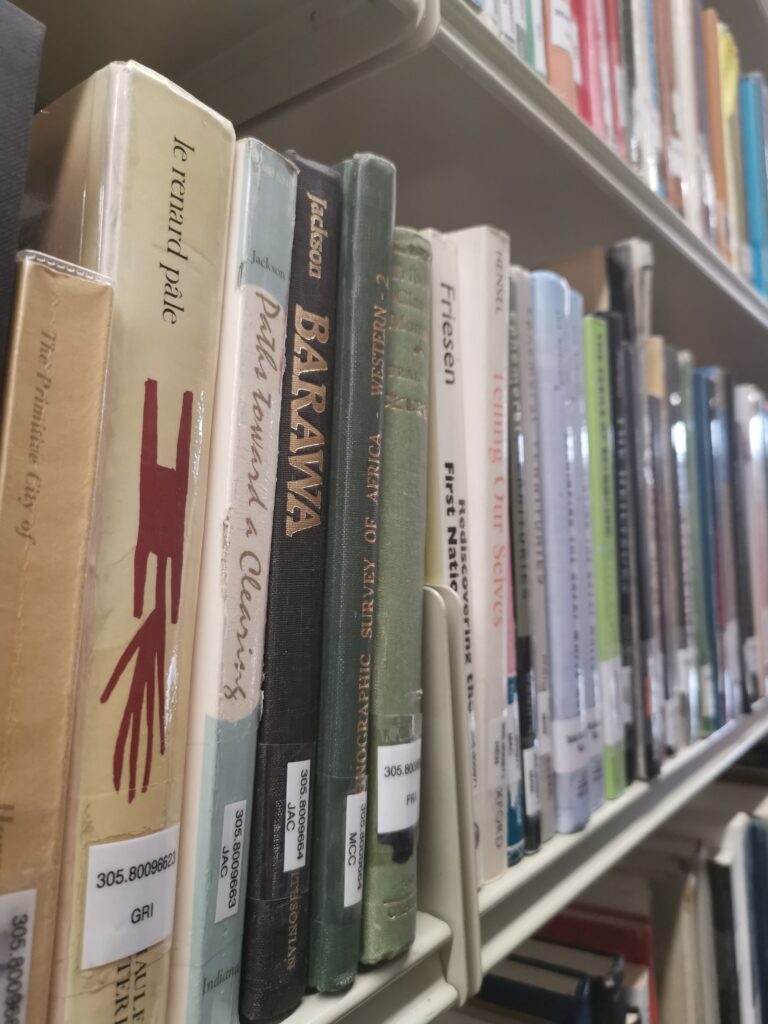
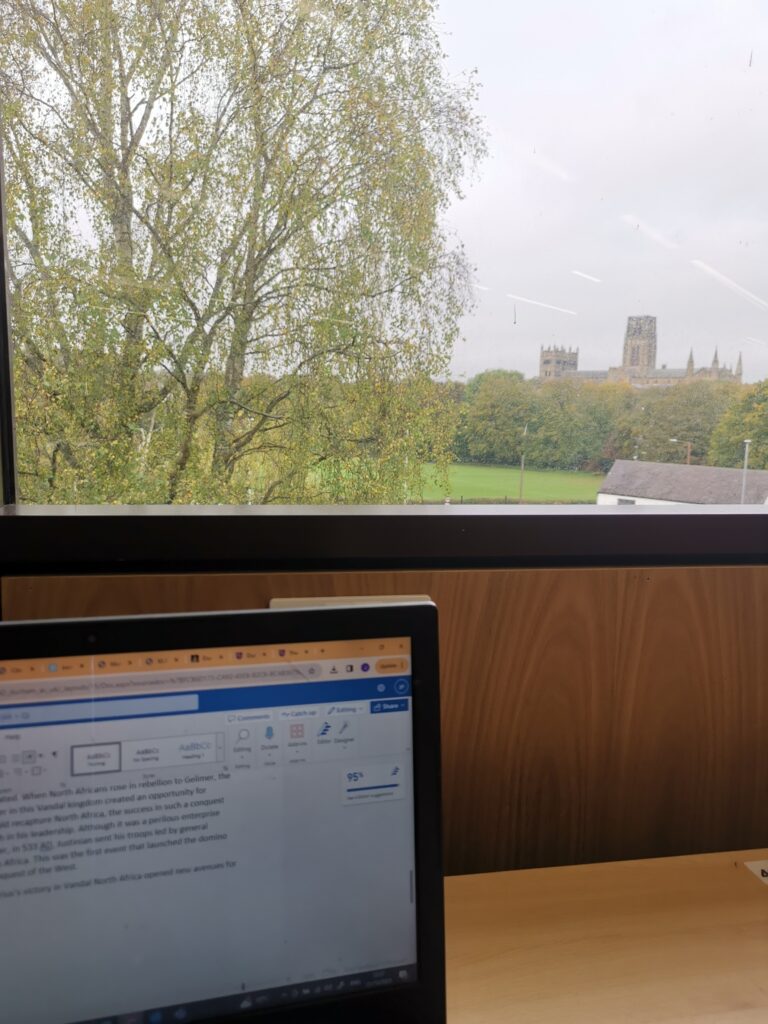
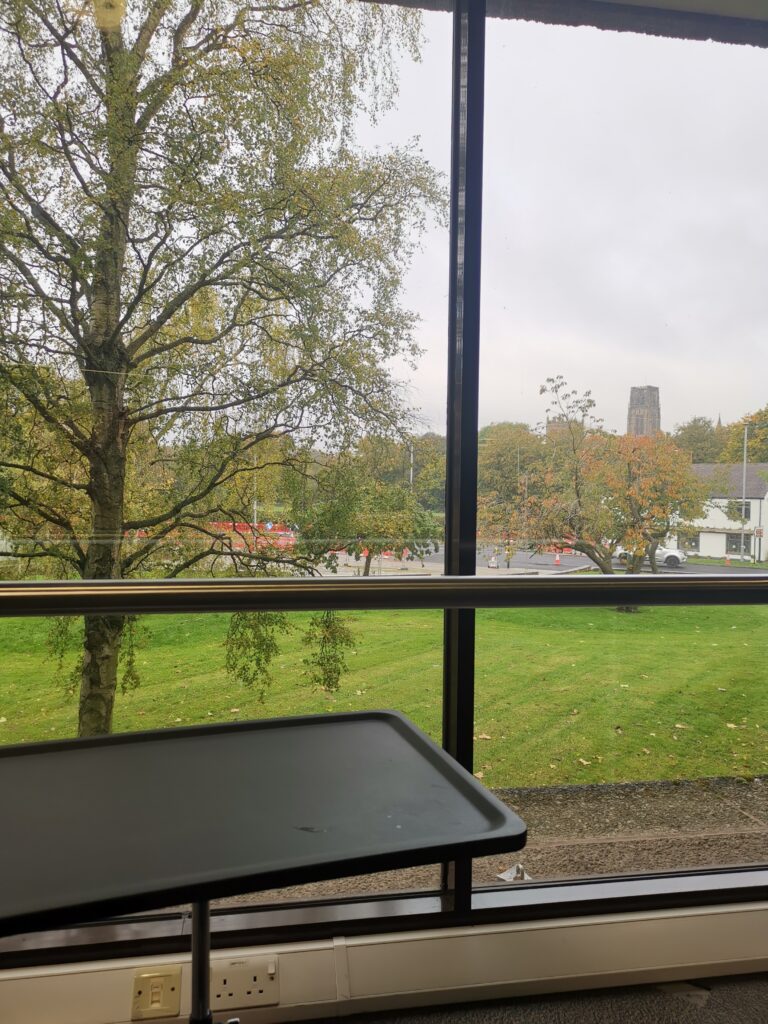
Societies
Alongside the academic work, another aspect of being a student at Durham, is getting involved in all of the societies. During Fresher’s week, there was a big events fair taking place at the sports centre, with all the different societies advertising what they do. There were so many different tables there for the societies, that it took quite a while to get from one end of the sports hall to the other. But by the end of it, I had taken away so many leaflets for things like the Purple Radio, Palatinate, and the Japanese society, that I was struggling to take it all home. Yet, that was perhaps the point of this fair for these societies, to distribute as many leaflets as possible to as many people as possible to see who joins and who doesn’t. To be honest, there were a lot of societies that didn’t work out. I was thinking about joining the Japanese society, considering that I am quarter Japanese but I didn’t have much time for it so that didn’t work out. I was also thinking of doing rowing. I attended a few sessions on the ergs (rowing machines) and I made a few friends when I was there. However, I missed the first swim test as I didn’t sign up for it in time and you needed to do that to actually get on the boats. In the end, the aim to get back into rowing kind of fizzled into nothing as the term became more busy.
Yet, there were other things that I was slightly more successful at doing. For instance, I wrote an article for Palatinate, the student newspaper at the university. I am not a regular writer with Palatinate as I thought that it would be quite stressful, considering how much I’ve already got to write for my course. However, I joined the Facebook group for the Politics section of the paper where they post content calls once a fortnight for their next editions. One week, they posted a content call where one of the topics that they wanted a story on were the elections that were taking place in Poland that Sunday. Having been to Warsaw myself, I thought it would be an interesting topic to take on. Initially, I thought my story wouldn’t get put in the paper as I didn’t really like how I had written it. Yet, I sent it over anyway and sure enough, it was going to be put on the second page of the Politics section on Thursday 26th October. It was a good feeling to see my name in print on the article and the process has inspired me to write other articles for the paper in the future so keep an eye out for that. The article on Poland is also on my website under the title “Poland at the polls: democracy, dynamics and the direction ahead,” if you would like to read it here too.
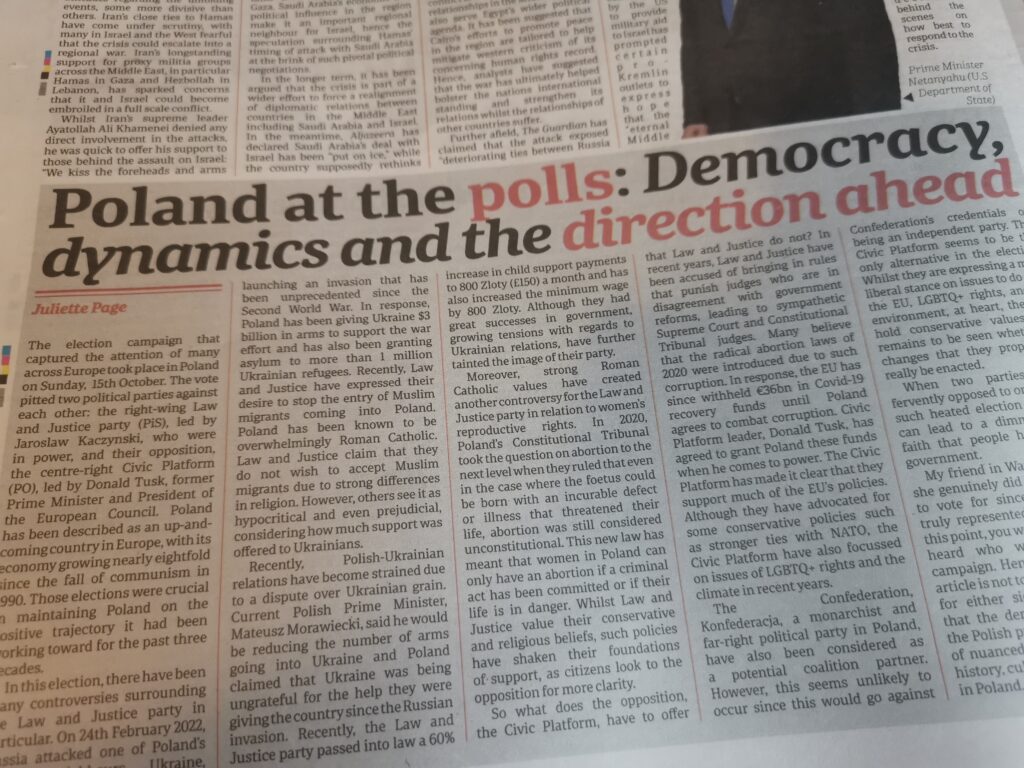
Alongside Palatinate, I also got involved with the Durham History Society, where I was able to meet fellow historians and a few other people on my course. I tried to audition for the contemporary and street dance competition groups for the university but I unfortunately didn’t get in. However, I’ve been going to the more recreational street dance classes at Hilde Bede College every Sunday and to be honest, I think these classes have been more enjoyable than being a part of the competition teams would have been, taking into consideration the time commitment that would have been required to be a part of the teams. I have however, taken part in the Ballroom and Latin dance classes with the university and I did a competition with my dance partner in Manchester a couple of weeks ago. That was a small commitment in itself and I was a little bit stressed doing that competition because it came towards the end of term when I was trying to write my summative essay. Yet, despite having to get the coach to Manchester at 4am on competition day, I had a really good time. Me and my partner got into the semi and quarter finals for waltz and quickstep, and then we got into the final for cha cha and the semi final for Jive. We went there just to have fun but getting the medal at the end for cha cha, felt really nice and it was a good way to finish off the day and arguably the term.
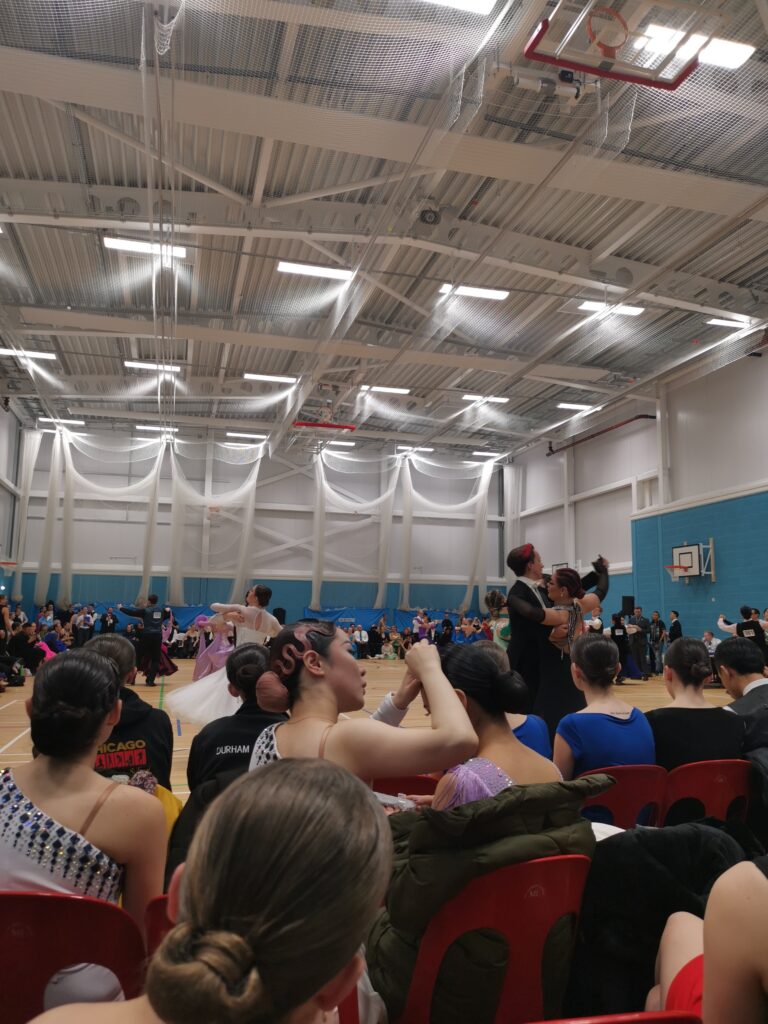
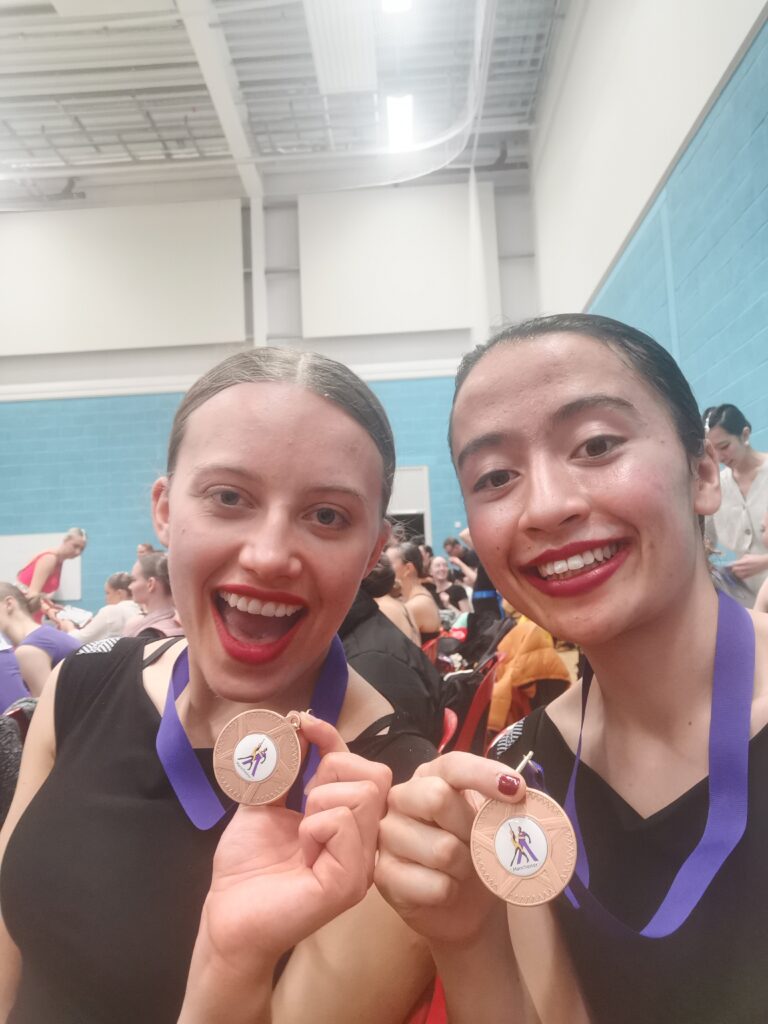
I feel like the process of finding what societies I should be involved in was akin to me trying to find what I actually enjoyed doing and who I actually enjoyed being around. Not everything worked out but the whole process was trial and error and I found that even if I didn’t continue with one thing, I got to know people anyway and maintained good contacts. That’s what you should be doing in the first term of the first year, giving everything a go and seeing what works out. One thing that I’ve found is that these contacts that you make can become incredibly valuable to you in the future. For instance, everyone knows that there is a housing crisis in Durham. Although every 1st year student is guaranteed accommodation on college, most have to find housing outside of college for the 2d and 3rd year and because Durham is so small, the market is very competitive and the housing is very limited. I thought this situation would become a great worry of mine during the first year since I saw a massive queue of students standing outside the housing agency everyday after my lectures. However, one day, a good friend who I had met during Freshers’ Week, messaged me on Instagram to see if I wanted to become the next person in a house that she found with her friends. The process of acquiring said house was not as easy as I initially thought it would be. I don’t trust many housing agencies but I think for the one’s in Durham, you have to be particularly wary because they can easily exploit the desperate housing market. My parents had initial reservations about the contract, which was understandable, but they got in contact with the parents of those I will be sharing a house with and after a few reassuring conversations, they signed the contract and now we have the house. Part of me feels quite undeserving of having the house as, although I have seen where I will be staying for the second year, I have not been to see a single housing agency and so I skipped most of the big queues that many other students were lining up in. It just goes to show, the value there is in developing your contacts and widening your network as you don’t know how it might aid you in the future. I don’t know how things will work out in the future but I am grateful anyway for the opportunity as now that is one less thing I have to think about.
To Round Off…
I’m also very grateful to have the current flatmates that I have now. Before going to university, I was genuinely really worried that things wouldn’t work out and I would have to put up with people I didn’t like for a year. However, I haven’t even labelled my food in the fridge because I trust that it’s not going to get taken, which I think is a fortunate position to be in. No doubt, we are all different people and there were some instances where I was just like “What the actual hell?” For example, I woke up one morning and did what I usually do, got myself ready and started to make my way to the kitchen to make breakfast. As I opened my bedroom door, what did I see outside in the corridor? A literal traffic cone. A literal traffic cone, stood right outside the room next to mine. When I questioned my flatmate from the neighbouring room a couple of days later, he said that he apparently went out on Friday night with his friends to Newcastle and somehow, the traffic cone appeared in the corridor the next morning. I did not know what exactly happened there but apparently he had plans to use the traffic cone as a door stop for the flat because he keeps on forgetting his keys. However, one time at around 2am on a Monday night, I was awoken by a loud thumping noise. At first I thought that it was in my dream but when it kept on going, I realised that it was my flatmate pounding at the door because he had forgotten his keys. Clearly he had forgotten to prop the door open with the traffic cone and now he was fully locked out! It wasn’t the casual knocking of someone trying to get in. It was as if it were the loud thumping of the KGB, trying to beat the door down! Thankfully, someone else opened the door for him and that was the only time that this happened. However, I honestly just find things like that so hilarious. Especially when things got intense with work, it brought some level of normality back to the flat to be honest.
That was my experience of the first term of university. If you’ve read this far, well done! I realise that I have written a lot here but I just wanted to animate the experience I’ve had so far and tell it in as honest a way as possible so that you could get an accurate picture of what the first term of university was really like for me. To say that it was a rollercoaster is an understatement. I had many ups and downs and at times, I was engaging in so many mental battles, just to get myself through the stressful periods. I’m sure I’ll have more moments like that to come. But I hope I’ve also shown you that university can be an enjoyable time period, full of funny moments and exciting times with friends. As someone who enjoys being in her own company, I think university so far has brought me out of my shell. Through learning to be more independent and being more confident to approach people, I’ve grown in character, which is ultimately all important progress.
I hope that you will continue to follow my progress for the next term!
See you next time,
XOX, Juliette
